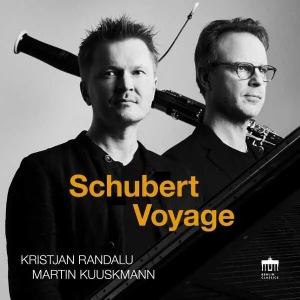
Franz Schubert (1797-1828)
Schubert Voyage‘Winterreise’, Op. 89 D911 (1827/2020, arr. bassoon & piano, Kristjan Randalu)
Martin Kuuskmann (bassoon)
Kristjan Randalu (piano)
rec. 2022, Hamilton Recital Hall, Denver, USA
Berlin Classics 0303720BC [59]
I have to be honest; this is one of the strangest CDs I’ve ever reviewed – or indeed ever heard. To be clear, these two musicians are both brilliant performers, but the project itself – and the basis of this recording – is perplexing, and in some ways ludicrous. Yet I found myself listening with a kind of horrified fascination. It’s hard to play the bassoon with your tongue in your cheek (I know – I’ve tried), but that’s what it often sounds like.
The impetus for the recording came from pianist Kristjan Randalu, who has a jazz background and also has a track record as a ‘crossover’ – dreaded word – artist. Not long ago, he produced a recording based on Mussorgsky’s Pictures at an Exhibition, in combination with the saxophonist David Liebman. Since then, he has recorded his own version of Schumann’s Dichterliebe for Berlin Classics, and in this disc continues that exploration of the Lied.
It should be said that Randalu has a deep feeling for the classical repertoire he works with, and that he obviously enjoys collaborating with accomplished, like-minded musicians. Here, he has teamed up with bassoonist Martin Kuuskmann, a fellow Estonian who now lives and works in the USA. Kuuskmann is an outrageously gifted and brilliant bassoonist, who has a reputation for playing not only the classic repertoire but also modern works; in fact, he has commissioned a large number of solo compositions, with some including amplification and electronic techniques.
There are twenty-four songs in Schubert’s original Winterrreise; Randalu and Kuuskmann have used only sixteen of them as the basis of their improvised fantasies. Be prepared for distortions of the harmonies and rhythms, although the harmonic changes are more in the way of added dissonant notes rather than anything more radical. The rhythmic changes, too, often come down to dropping or adding all or part of a beat, thus creating uneven, asymmetrical patterns.
The famous opening song, Gute Nacht (‘Goodnight’), puts before us the central character, rejected by his lover, and leaving her home in the middle of the night. Randalu has him walking out into what seems like a raging storm, with Schubert’s gentle accompanying quavers loaded with added ‘scrunches’ and heavy cross-rhythms. The bassoon, which delivers Schubert’s original melody (here in E minor), struggles to compete, something that happens a lot, but which may be part of the creative intention.
Track 3 is titled ‘Schreck’, meaning ‘shock’ or ‘fright’, while track 8 is ‘Vorschau’ – ‘Preview’. You won’t find songs of these names in Schubert’s cycle; instead, we have brilliant solos for the bassoon, in each case leading directly into the next song; ‘Schreck’ into ‘Erstarrung’ (‘Frozen’) and ‘Vorschau’ into ‘Rückblick’ (‘Looking Back’), where we get fantastic free improvisations by Randalu – these solo break-outs are the most thrilling and engaging parts of the disc for me.
I felt disappointed that the pair haven’t included Schubert’s devastating final song, ‘Der Leiermann’ – the poor old hurdy-gurdy man that no-one is listening to. Overall, I’m not sure whether you can rate this project as a success; in some ways, I find it difficult to work out what they are aiming to achieve from a musical point of view, and precisely where Franz Schubert comes into it, but against that, I have to say that I found the CD riveting, partly because I am a bassoon lover, partly because I’m a Schubert ‘nut’ and partly because I was blown away by many of Randalu’s flights of fancy. Whatever it was, it held me; give it a try; it might do the same for you.
Gwyn Parry-Jones
Buying this recording via a link below generates revenue for MWI, which helps the site remain free




















